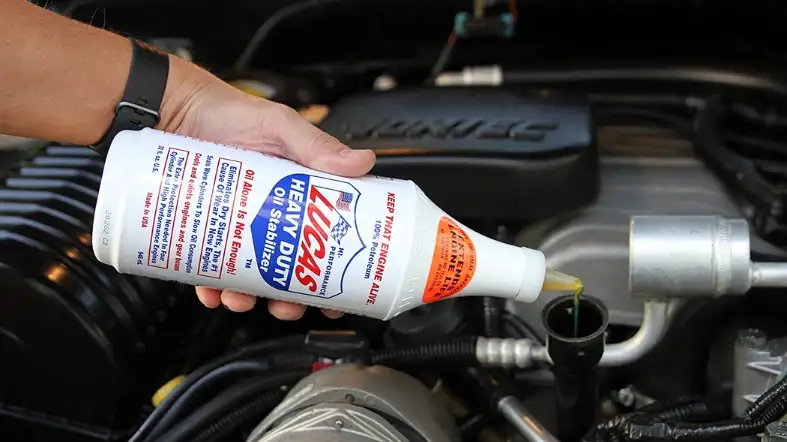Lucas Oil Stabilizer is a popular engine oil additive that promises to reduce engine wear, prevent oil breakdown, and extend the life of your engine.
But what exactly does it do, and how does it work?
In this blog post, we’ll take a closer look at Lucas Oil Stabilizer and explore the benefits and drawbacks of using it in your vehicle.

What Does Lucas Oil Stabilizer Do?
Lucas Oil Stabilizer reduces friction and wear in engines, transmissions, and other mechanical components by creating a protective film on metal surfaces. It improves fuel economy, reduces emissions, and extends oil life up to 50% longer.
Benefits of Using Lucas Oil Stabilizer:
Here are some key advantages of using Lucas Oil Stabilizer that you should consider:
Reducing engine temperature:
Engine heat can cause overheating and damage.
Lucas Oil Stabilizer can help reduce engine temperature by improving oil circulation and reducing friction between engine components.
This can help prevent costly engine repairs and keep your vehicle running smoothly.
Increasing fuel mileage:
Lucas Oil Stabilizer can help increase your vehicle’s fuel mileage by improving oil density and reducing engine friction.
Your engine can run more efficiently, using less fuel for the same performance.
Better engine performance:

Lucas Oil Stabilizer can improve engine performance in a number of ways.
Increasing oil pressure and density, can help reduce engine wear and tear, prevent dry starts, and improve overall engine efficiency.
This can lead to better acceleration, smoother shifting, and increased power output.
Quieting noisy engines:
If you have a noisy engine, Lucas Oil Stabilizer can help to quiet it down by reducing friction and wear on engine components.
This can help eliminate annoying engine noise and make your vehicle run more smoothly.
Extending engine life:
Reducing wear and tear on the engine is key to extending its lifespan.
By improving oil circulation and reducing friction, Lucas Oil Stabilizer can help protect your engine from damage and keep it running smoothly for longer.
This can prevent expensive repairs and keep your car running for years.
Safe for use in all grades of oil:
Lucas Oil Stabilizer is a versatile product that can be safely used with all grades of oil, including synthetic, ATF, and mineral oil.
This means that you can use it with any type of oil that your vehicle requires, without worrying about compatibility issues.
Controlling blow-by, dry starts, and oil burning:
Lucas High Mileage Oil Stabilizer is specially formulated to help control blow-by, dry starts, and oil burning.
This can help maximize engine efficiency, reduce harmful emissions, and extend oil life.
Additionally, it can be used as an assembly lube, making it a great option for engine builders and mechanics.
Safe for use in all 2 and 4-cycle engines:
Lucas Oil Fuel Stabilizer is designed to prevent gasoline breakdown during storage, making it a great option for seasonal equipment like boats and motorcycles.
It is safe to use in all grades of gasoline and in all 2 and 4-cycle engines, making it a versatile product that can be used in a variety of applications.
Using Lucas Oil Stabilizer: What You Need to Know

Lucas Oil Stabilizer improves engine performance and lifespan. It can be used with synthetic and petroleum-based oils because it’s petroleum-based.
According to Lucas.com, you can mix Lucas Oil Stabilizer with every oil change, using a ratio of 20% stabilizer and 80% oil.
This product can also be used to top off oil changes or reduce oil consumption in an older engine or maintain peak performance in a new engine.
Additionally, Lucas Oil Stabilizer can be used in gear oil to stop leaks and increase the life of the gear oil.
What Types of Oil Can Be Used with Lucas Oil Stabilizer?
Lucas Heavy Duty Oil Stabilizer is 100% petroleum-based and can be safely blended with all other automotive lubricants, including automatic transmission fluid, mineral oil, petroleum oils, and synthetic oils.
In most automotive applications, a 20% stabilizer to 80% oil ratio is recommended.
If you’re using Lucas Oil Stabilizer in the differential, use a 50/50 ratio.
If you’re looking to improve manual transmission function, use a 25/75 ratio with 25% stabilizer and 75% transmission fluid.
It’s worth noting that Lucas Oil Stabilizer should not be used with any system fluids other than oil and lubricants.
Potential Problems with Lucas Oil Stabilizer
Here are some potential problems with Lucas oil stabilizer:
Engine wear and failure
One of the most commonly reported issues with Lucas Oil Stabilizer is increased engine wear and tear, which can lead to premature engine failure.
This is because the product contains friction modifiers that can reduce the lubricating properties of the oil, causing increased wear and tear on engine parts.
If you’re concerned about the long-term health of your engine, it may be best to avoid using oil stabilizers like Lucas Oil Stabilizer.
Corrosion leading to engine damage
Another potential issue with using Lucas Oil Stabilizer is that it can lead to corrosion and engine damage.
Some users have reported that the product can cause rust to form on engine parts, which can lead to damage and even failure over time.
This is a particularly concerning issue, as engine damage can be expensive to repair and can impact the safety and performance of your vehicle or machinery.
Cold performance issues
Lucas Oil Stabilizer has also been known to cause harder cold starts and viscosity issues in low temperatures.
This is because the product can thicken in colder temperatures, making it harder for the engine to start and causing performance issues.
If you live in an area with cold temperatures, it’s important to be aware of this potential issue before using Lucas Oil Stabilizer.
Lower fuel economy
Another issue that some users have reported with Lucas Oil Stabilizer is the lower gas mileage.
This is because the product can change the viscosity of the oil, making it harder for the engine to operate efficiently and causing a decrease in fuel economy.
If you’re concerned about getting the best gas mileage possible, it may be best to avoid using oil stabilizers like Lucas Oil Stabilizer.
Buildup of sludge
The use of Lucas Oil Stabilizer has also been associated with the build-up of sludge in engines.
This is because the product can cause oil to become thicker and stickier, which can lead to the accumulation of sludge in the engine over time.
Sludge buildup can cause a range of issues, including decreased performance and even engine failure, so it’s important to be aware of this potential issue before using Lucas Oil Stabilizer.
Warranty violations
Using oil stabilizers like Lucas Oil Stabilizer can also result in warranty voidance for some car manufacturers.
This is because some manufacturers do not approve of the use of oil stabilizers, and using these products can result in a violation of your warranty.
If you’re concerned about maintaining your warranty, it’s important to check with your car manufacturer before using any oil stabilizer products.
No scientific approval
Ultimately, Lucas Oil Stabilizer has no scientific backing. Lucas Oil Stabilizer is not supported by science, however, some users have reported favorable results.
If you want a fuel additive that has been scientifically shown to boost engine performance and stability, seek elsewhere.
Frequently Asked Questions
Can Lucas Oil Stabilizer Be Used In All Types Of Engines?
Lucas Oil Stabilizer can be used in all types of engines, including gasoline and diesel engines, as well as marine and industrial engines.
Is Lucas Oil Stabilizer Compatible With Synthetic Oils?
Yes, Lucas Oil Stabilizer is compatible with synthetic oils and can be used to enhance their performance.
How Much Lucas Oil Stabilizer Should I Use?
The recommended amount of Lucas Oil Stabilizer to use is 20% of your engine’s oil capacity.
For example, if your engine holds five quarts of oil, you should add one quart of Lucas Oil Stabilizer.
How Often Should I Use Lucas Oil Stabilizer?
Lucas Oil Stabilizer should be used every time you change your engine oil.
This will ensure that your engine is consistently protected and running at optimal performance.
Can Lucas Oil Stabilizer Fix Existing Engine Problems?
While Lucas Oil Stabilizer can help prevent engine problems and improve engine performance, it cannot fix existing engine problems.
If you are experiencing engine issues, it is recommended that you seek the assistance of a qualified mechanic.
Conclusion
Lucas Oil Stabilizer is a top-quality engine oil additive that helps extend the life of your engine by reducing friction, decreasing engine noise, and increasing oil pressure.
Anybody looking to boost vehicle performance and protect their investment should consider it. Lucas Oil Stabilizer keeps engines running smoothly in new and old cars.
